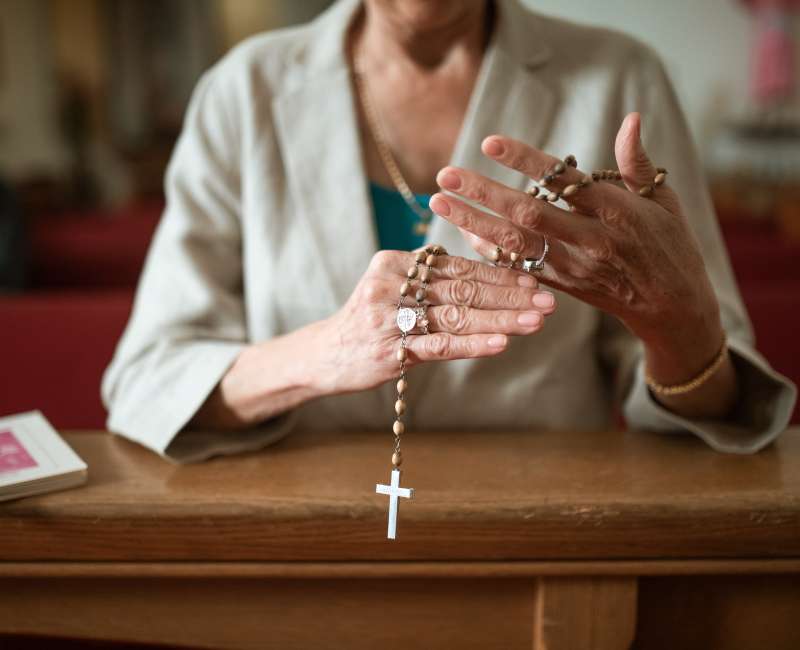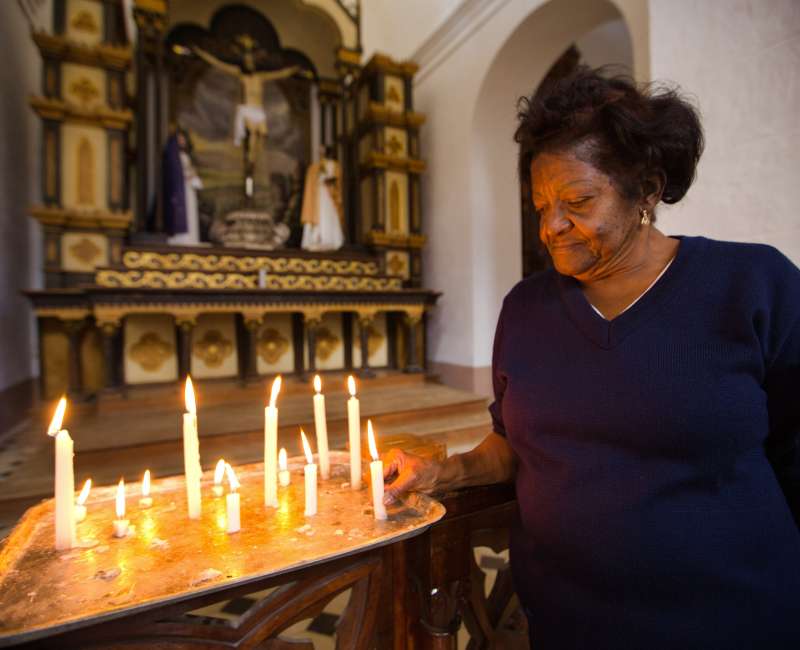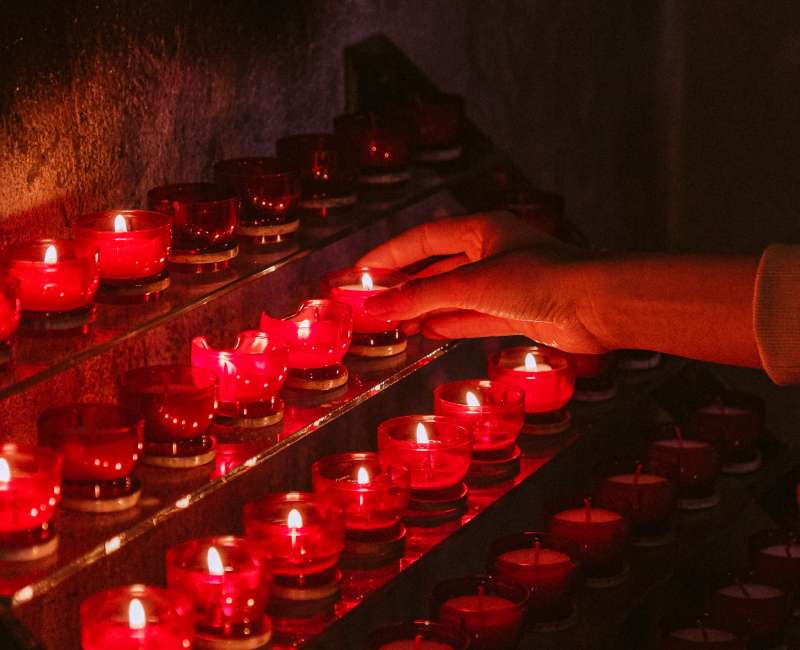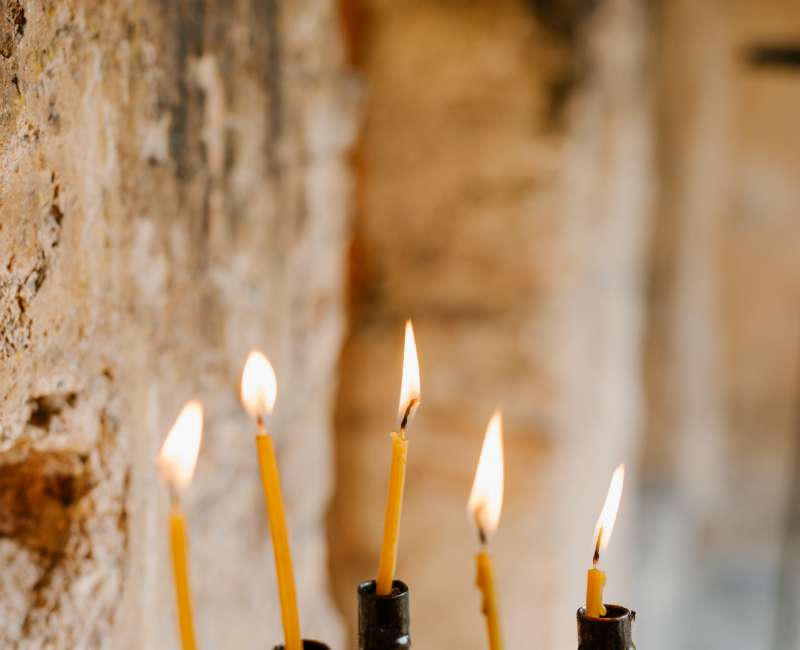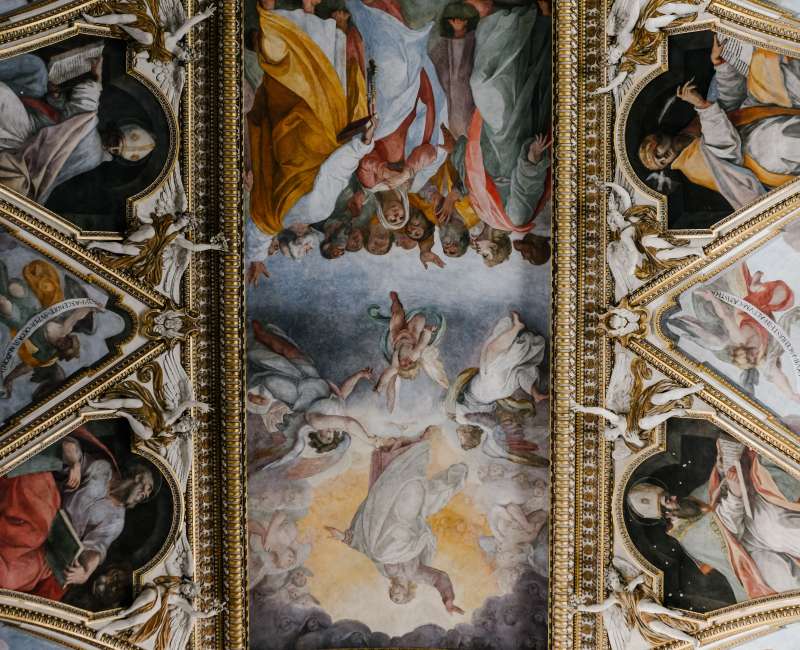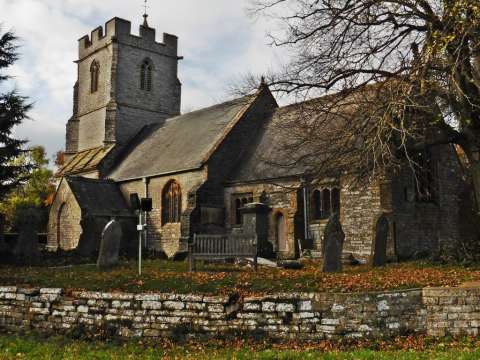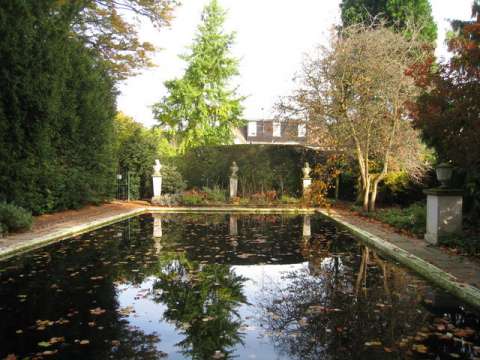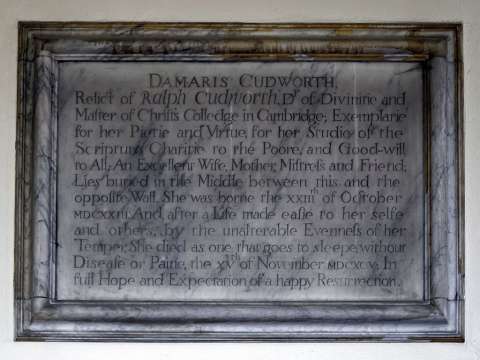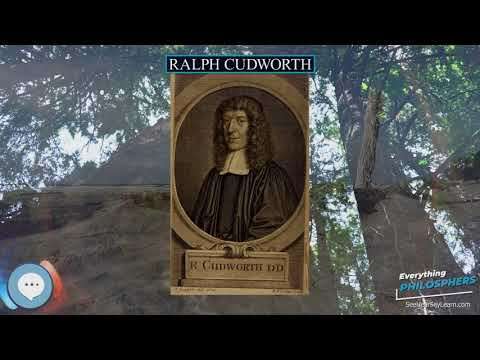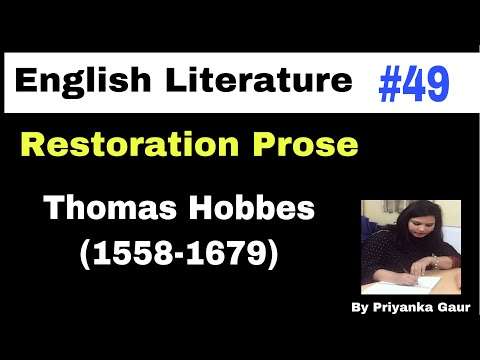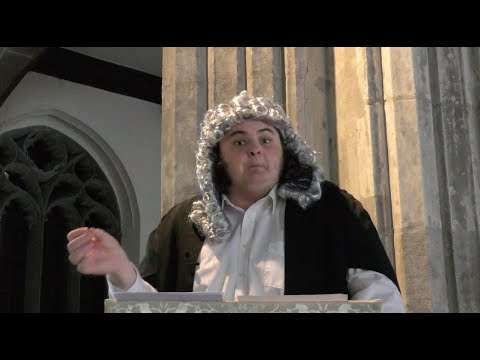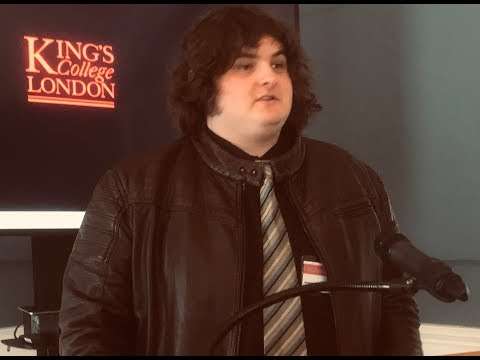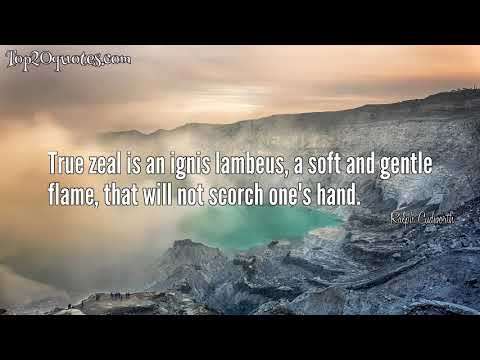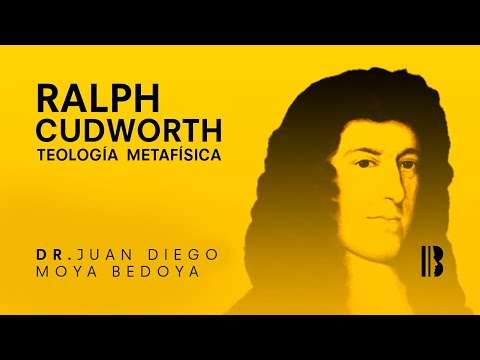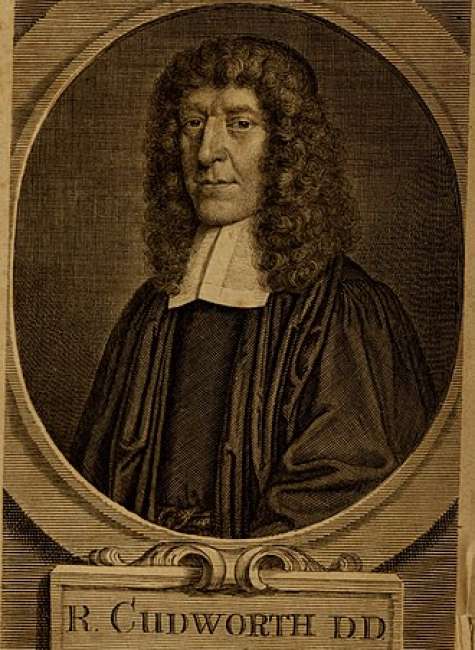

Ralph Cudworth (1617-1688)
The best assurance any one can have of his interest in God, is doubtless the conformity of his soul to Him. When our heart is once turned into a conformity with the mind of God. when we feel our will conformed to His will, we shall then presently perceive a spirit of adoption within ourselves, teaching us to say, "Abba, Father."
Ralph Cudworth was an English Anglican clergyman, Christian Hebraist, classicist, theologian and philosopher, and a leading figure among the Cambridge Platonists. From a family background embedded in the early nonconformist environment of Emmanuel College where he studied 1630–45, he became 11th Regius Professor of Hebrew 1645–88, 26th Master of Clare Hall 1645–54, and 14th Master of Christ's College 1654–88. He was a leading opponent of Thomas Hobbes's political and philosophical views, and his magnum opus was his The True Intellectual System of the Universe 1678.
Family background
Ancestry
Cudworth's family reputedly originated in Cudworth near Barnsley, Yorkshire, moving to Lancashire with the marriage c.1377 of John de Cudworth d.1384 and Margery d.1384, daughter of Richard de Oldham living 1354, lord of the manor of Werneth, Oldham. The Cudworths of Werneth Hall, Oldham, were lords of the manor of Werneth/Oldham, until 1683. Ralph Cudworth the philosopher’s father, Ralph Cudworth Snr was the posthumous-born second son of Ralph Cudworth d.1572 of Werneth Hall, Oldham.
The Rev. Dr Ralph Cudworth Snr 1572/3–1624
The philosopher's father, The Rev. Dr Ralph Cudworth 1572/3–1624, was educated at Emmanuel College, Cambridge, where he graduated BA 1592/93, MA 1596. Emmanuel College founded by Sir Walter Mildmay 1584, and under the direction of its first Master, Laurence Chaderton was, from its inception, a stronghold of Reformist, Puritan and Calvinist teaching, which shaped the development of puritan ministry, and contributed largely to the emigrant ministry in America.
Ordained in 1599 and elected to a college fellowship by 1600, Cudworth Snr was much influenced by William Perkins, whom he succeeded, in 1602, as Lecturer of the Parish Church of St Andrew the Great, Cambridge. He was awarded the degree of Bachelor of Divinity in 1603. He edited Perkins's Commentary on St Paul's Epistle to the Galatians 1604, with a dedication to Robert, 3rd Lord Rich later 1st Earl of Warwick, adding a commentary of his own with dedication to Sir Bassingbourn Gawdy. Lord Rich presented him to the Vicariate of Coggeshall, Essex 1606 to replace the deprived minister Thomas Stoughton, but he resigned this position March 1608, and was licensed to preach from the pulpit by the Chancellor and Scholars of the University of Cambridge November 1609. He then applied for the Rectoriate of Aller, Somerset an Emmanuel College living and, resigning his fellowship, was appointed to it in 1610.

His marriage 1611 to Mary Machell c.1582–1634, who had been "nutrix" – nurse, or preceptor – to Henry Frederick, Prince of Wales brought important connections. Cudworth Snr was appointed as one of James I's chaplains. Mary's mother or aunt was the sister of Sir Edward Lewknor, a central figure with the Jermyn and Heigham families among the puritan East Anglian gentry, whose children had attended Emmanuel College. Mary's Lewknor and Machell connections with the Rich family included her first cousins Sir Nathaniel Rich and his sister Dame Margaret Wroth, wife of Sir Thomas Wroth of Petherton Park near Bridgwater, Somerset, influential promoters of colonial enterprise and later of nonconformist emigration in New England. Aller was immediately within their sphere.
Ralph Snr and Mary settled at Aller, where their children listed below were christened during the following decade. Cudworth continued to study, working on a complete survey of Case-Divinity, The Cases of Conscience in Family, Church and Commonwealth while suffering from the agueish climate at Aller. He was awarded the degree of Doctor of Divinity 1619, and was among the dedicatees of Richard Bernard's 1621 edition of The Faithfull Shepherd. Ralph Snr died at Aller declaring a nuncupative will 7 August 1624 before Anthony Earbury and Dame Margaret Wroth.
Children
The children of Ralph Cudworth Snr and Mary née Machell Cudworth c.1582–1634 were:
- General James Cudworth 1612–82 was Assistant Governor 1756–8, 1674–80 and Deputy Governor 1681–2 of Plymouth Colony, Massachusetts, and four-times Commissioner of the United Colonies 1657–81, whose descendants form an extensive family of American Cudworths.
- Elizabeth Cudworth 1615–54 married 1636 Josias Beacham of Broughton, Northamptonshire Rector of Seaton, Rutland 1627–76, by whom she had several children. Beacham was ejected from his living by the Puritans 1653, but reinstated by 1662.
- Ralph Cudworth Jnr
- Mary Cudworth
- John Cudworth 1622–75 of London and Bentley, Suffolk, Alderman of London, and Master of the Worshipful Company of Girdlers 1667–68. On his death, John left four orphans of whom both Thomas Cudworth 1661–1726 and Benjamin Cudworth 1670–15 Sept. 1725 attended Christ's College, Cambridge. Benjamin Cudworth's black memorial slab is in St. Margaret's parish church, Southolt, Suffolk.
- Jane/Joan? Cudworth b.c.1624; fl. unmarried, 1647 may have been Ralph's sister.
Career
Education
The second son, and third of five probably six children, Ralph Cudworth Jnr was born at Aller, Somerset, where he was baptised 13 July 1617. Following the death of his father, Ralph Cudworth Snr 1624, The Rev. Dr John Stoughton 1593–1639, son of Thomas Stoughton of Coggeshall; also a Fellow of Emmanuel College, succeeded as Rector of Aller, and married the widow Mary née Machell Cudworth c.1582–1634. Dr Stoughton paid careful attention to his stepchildren's education, which Ralph later described as a "diet of Calvinism". Letters, to Stoughton, by both brothers James and Ralph Cudworth make this plain; and, when Ralph matriculated at Emmanuel College, Cambridge 1632, Stoughton thought him "as wel grounded in Schol-Learning as any Boy of his Age that went to the University". Stoughton was appointed Curate and Preacher at St Mary Aldermanbury, London 1632, and the family left Aller. Ralph's elder brother, James Cudworth, married and emigrated to Scituate, Plymouth Colony, New England 1634. Mary Machell Cudworth Stoughton died during summer 1634, and Dr Stoughton married a daughter of John Browne of Frampton and Dorchester.
Pensioner, Student and Fellow of Emmanuel College 1630–45
A diligent student, Cudworth was admitted as a pensioner to Emmanuel College, Cambridge 1630, matriculated 1632, and graduated BA 1635/6; MA 1639. After some misgivings which he confided in his stepfather, he was elected a Fellow of Emmanuel 1639, and became a successful tutor, delivering the Rede Lecture 1641. He published a tract entitled The Union of Christ and the Church, in a Shadow 1642, and another, A Discourse concerning the True Notion of the Lord's Supper 1642, in which his readings of Karaite manuscripts stimulated by meetings with Johann Stephan Rittangel were influential.
11th Regius Professor of Hebrew 1645 and 26th Master of Clare Hall 1645–54
Following sustained correspondence with John Selden to whom he supplied Karaite literature, he was elected aged 28 as 11th Regius Professor of Hebrew 1645. In 1645, Thomas Paske had been ejected as Master of Clare Hall for his Anglican allegiances, and Cudworth despite his immaturity was selected as his successor, as 26th Master but not admitted until 1650. Similarly, his fellow-theologian Benjamin Whichcote was installed as 19th Provost of King's College. Cudworth attained the degree of Bachelor of Divinity 1646, and preached a sermon before the House of Commons of England on 1 John 2, 3–4, which was later published with a Letter of Dedication to the House 1647. Despite these distinctions and his presentation, by Emmanuel College, to the Rectoriate of North Cadbury, Somerset 3 October 1650, he remained comparatively impoverished. He was awarded the degree of Doctor of Divinity 1651, and, in January 1651/2, his friend Dr John Worthington wrote of him, "If through want of maintenance he should be forced to leave Cambridge, for which place he is so eminently accomplished with what is noble and Exemplarily Academical, it would be an ill omen."
Marriage 1654 and 14th Master of Christ's College 1654–88
Cudworth was elected 29 October 1654 and admitted 2 November 1654, as 14th Master of Christ's College. His appointment coincided with his marriage to Damaris d.1695, daughter by his first wife, Damaris of Matthew Cradock d.1641, first Governor of the Massachusetts Bay Company. Hence Worthington commented "After many tossings Dr Cudworth is through God's good Providence returned to Cambridge and settled in Christ's College, and by his marriage more settled and fixed."

In his Will 1641, Matthew Cradock had divided his estate beside the Mystic River at Medford, Massachusetts which he had never visited, and was managed on his behalf into two moieties: one was bequeathed to his daughter Damaris Cradock d.1695, later wife of Ralph Cudworth Jnr; and one was to be enjoyed by his widow Rebecca during her lifetime, and afterwards to be inherited by his brother, Samuel Cradock 1583–1653, and his heirs male. Samuel Cradock's son, Samuel Cradock Jnr 1621–1706, was admitted to Emmanuel 1637, graduated BA 1640–1; MA 1644; BD 1651, was later a Fellow 1645–56, and pupil of Benjamin Whichcote. After part of the Medford estate was rented to Edward Collins 1642, it was placed in the hands of an attorney; the widow Rebecca Cradock whose second and third husbands were Richard Glover and Benjamin Whichcote, respectively, petitioned the General Court of Massachusetts, and the legatees later sold the estate to Collins 1652.
The marriage of the widow Rebecca Cradock, to Cudworth's colleague Benjamin Whichcote laid the way for the union between Cudworth and her stepdaughter, Damaris d.1695, thereby reinforcing the connections between the two scholars through a familial bond. Damaris had married, firstly 1642, Thomas Andrewes Jnr d.1653 of London and Feltham, son of Sir Thomas Andrewes d.1659, Lord Mayor of London, 1649, 1651–2, which union had produced several children. The Andrewes family were also engaged in the Massachusetts project, and strongly supported puritan causes.
Commonwealth and Restoration
Cudworth emerged as a central figure among that circle of theologians and philosophers known as the Cambridge Platonists, who were more or less in sympathy with the Commonwealth: during the later 1650s, Cudworth was consulted by John Thurloe, Oliver Cromwell's Secretary to the Council of State, with regard to certain university and government appointments and various other matters. During 1657, Cudworth advised Bulstrode Whitelocke's sub-committee of the Parliamentary "Grand Committee for Religion" on the accuracy of editions of the English Bible. Cudworth was appointed Vicar of Great Wilbraham, and Rector of Toft, Cambridgeshire Ely diocese 1656, but surrendered these livings 1661 and 1662, respectively when he was presented, by Dr Gilbert Sheldon, Bishop of London, to the Hertfordshire Rectory of Ashwell 1 December 1662.

Given Cudworth's close cooperation with prominent figures in Oliver Cromwell's regime such as John Thurloe, Cudworth's continuance as Master of Christ's was challenged at the Restoration but, ultimately, he retained this post until his death. He and his family are believed to have resided in private lodgings at the "Old Lodge" which stood between Hobson Street and the College Chapel, and various improvements were made to the College rooms in his time.
Later life
In 1665, Cudworth almost quarrelled with his fellow-Platonist, Henry More, because of the latter's composition of an ethical work which Cudworth feared would interfere with his own long-contemplated treatise on the same subject. To avoid any difficulties, More published his Enchiridion ethicum 1666–69, in Latin; However, Cudworth's planned treatise was never published. His own majestic work, The True Intellectual System of the Universe 1678, was conceived in three parts of which only the first was completed; he wrote: "there is no reason why this volume should therefore be thought imperfect and incomplete, because it hath not all the Three Things at first Designed by us: it containing all that belongeth to its own particular Title and Subject, and being in that respect no Piece, but a Whole."

Cudworth was installed as Prebendary of Gloucester 1678. His colleague, Benjamin Whichcote, died at Cudworth's house in Cambridge 1683, and Cudworth himself died 26 June 1688, and was buried in the Chapel of Christ's College. An oil portrait of Cudworth from life hangs in the Hall of Christ's College. During Cudworth's time an outdoor Swimming Pool was created at Christ's College which still exists, and a carved bust of Cudworth there accompanies those of John Milton and Nicholas Saunderson.
Cudworth's widow, Damaris née Cradock Andrewes Cudworth d.1695, maintained close connections with her daughter, Damaris Cudworth Masham, at High Laver, Essex, which was where she died, and was commemorated in the church with a carved epitaph reputedly composed by the philosopher John Locke.
Children
The children of Ralph Cudworth and Damaris née Cradock Andrewes Cudworth d.1695 were:
- John Cudworth c.1656–1726 was admitted to Christ's College, Cambridge 1672, graduated BA 1676–7; MA 1680, and was a pupil of Mr Andrewes. He was a Fellow 1678–98, was ordained a priest 1684, and later became Lecturer in Greek 1687/8 and Senior Dean 1690.
- Charles Cudworth d.1684 was admitted to Trinity College, Cambridge 1674–6, but may have not graduated, instead, making a career in the factories of Kasimbazar, West Bengal, India, which was where John Locke friend of his sister Damaris Cudworth, corresponded with him 27 April 1683. He married February 1683/84, Mary Cole, widow of Jonathan Prickman, Second for the English East India Company at Malda. Charles Cudworth died in March 1684.
- Thomas Cudworth graduated at Christ's College, Cambridge MA 1682.
- Damaris Cudworth 1659–1708, a devout and talented woman, became the second wife 1685 of Sir Francis Masham, 3rd Baronet c.1646–1723 of High Laver, Essex. Lady Masham was a friend of the philosopher John Locke, and also a correspondent of Gottfried Leibniz. Her son, Francis Cudworth Masham d.1731, became Accountant-General to the Court of Chancery.
The stepchildren of Ralph Cudworth children of Damaris née Cradock Andrewes d.1695 and Thomas Andrewes d.1653 were:
- Richard Andrewes living 1688 who, according to Peile, is not the Richard Andrewes who attended Christ's College, Cambridge during this period.
- John Andrewes d. after 1688? matriculated at Christ's College, Cambridge 1664, graduated BA 1668/9; MA 1672, was ordained deacon and priest 1669–70, and was a Fellow 1669–75. Peile suggests he died c.1675, but he was a legatee in the will of his brother Thomas 1688. John Covel attended a "Pastoral" performed by Cudworth's children contrived by John Andrewes.
- Thomas Andrewes d.1688, Citizen and Dyer of London, was a linen draper. He married August 1681, Anna, daughter of Samuel Shute, of St Peter's, Cornhill.
- Mathew Andrewes d.1674 was admitted to Queens' College, Cambridge 1663/4, and later elected a Fellow.
- Damaris Andrewes d.1687 married 1661, as his first wife Sir Edward Abney 1631–1728, a student at Christ's College, Cambridge BA 1649–52/53; Fellow 1655–61; and Doctor of both laws 1661.
Works
Christianity portal
Sermons and Treatises
Cudworth's works included The Union of Christ and the Church, in a Shadow 1642; A Sermon preached before the House of Commons 1647; and A Discourse concerning the True Notion of the Lord's Supper 1670. Much of Cudworth's work remains in manuscript. However, certain surviving works have been published posthumously, such as A Treatise concerning eternal and immutable Morality, and A Treatise of Freewill.
A Treatise concerning eternal and immutable Morality posth.
Cudworth's Treatise on eternal and immutable Morality, published with a preface by Edward Chandler 1731, is about the historical development of British moral philosophy. It answers, from the standpoint of Platonism, Hobbes's famous doctrine that moral distinctions are created by the state: just as knowledge contains a permanent intelligible element over and above the flux of sense-impressions, so there exist eternal and immutable ideas of morality. Cudworth's ideas like those of Plato have "a constant and never-failing entity of their own"
A Treatise of Freewill posth.
Another posthumous publication was Cudworth's A Treatise of Freewill, edited by John Allen 1838. Both this and the Treatise on eternal and immutable Morality are connected with the design of his magnum opus, The True Intellectual System of the Universe.
The True Intellectual System of the Universe 1678
In 1678, Cudworth published The True Intellectual System of the Universe: the first part, wherein all the reason and philosophy of atheism is confuted and its impossibility demonstrated, which had been given an Imprimatur for publication 29 May 1671.
The Intellectual System arose, so Cudworth informs us, from a discourse refuting "fatal necessity", or determinism. Enlarging his plan, he proposed to prove three matters:
(a) the existence of God;
(b) the naturalness of moral distinctions; and
(c) the reality of human freedom.
These three comprise, collectively, the intellectual as opposed to the physical system of the universe; and they are opposed, respectively, by three false principles: atheism, religious fatalism which refers all moral distinctions to the will of God, and the fatalism of the ancient Stoics who recognized God and yet identified Him with nature. The immense fragment dealing with atheism was all that was published, perhaps because of the theological clamour raised against this first part.
Cudworth criticizes two main forms of materialistic atheism: the atomic adopted by Democritus, Epicurus and Hobbes; and the hylozoic attributed to Strato of Lampsacus, which explains everything by the supposition of an inward self-organizing life in matter. Atomic atheism is by far the more important, if only because Hobbes the great antagonist whom Cudworth always has in view, is supposed to have held this view. It arises from the combination of two principles, neither of which is, individually, atheistic namely atomism and corporealism or the doctrine that nothing exists but body. The example of Stoicism, as Cudworth suggests, shows that corporealism may be theistic.

Cudworth plunges into the history of atomism with vast erudition. It is, in its purely physical application a theory that he fully accepts, he holds that atomism was taught by Pythagoras, Empedocles and, in fact, nearly all the ancient philosophers, and was only perverted to atheism by Democritus. Cudworth believes that atomism was first invented before the Trojan war by a Sidonian thinker named Moschus or Mochus identical with Moses in the Old Testament. In dealing with atheism, Cudworth's method was to marshal the atheistic arguments elaborately, so elaborately that Dryden then, in his last chapter which, by itself, is the length of an ordinary treatise, he confutes the arguments with all the reasons that his reading could supply. A subordinate matter in the book which attracted much attention at the time was the conception of the "Plastic Medium" a mere revival of Plato's "World-Soul," which is intended to explain the existence and laws of nature without referring to the direct operation of God, which occasioned a long-drawn controversy, between Pierre Bayle and Le Clerc the former maintaining; the latter denying, that the Plastic Medium is favourable to atheism.
Commentary on Cudworth
Andrew Dickson White wrote in his A History of the Warfare of Science with Theology in Christendom 1896:


















